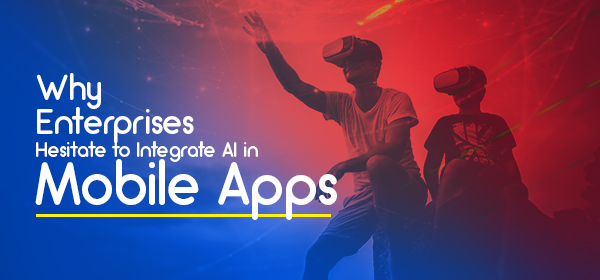The digital landscape is shaken with a lot of buzz around investments and integration of AI in businesses. While Artificial intelligence could be an answer to so problems regarding customer services and business revenue, the potential of AI technology has become one of business apprehensions due to uncanny doubts about the application of fully automated, data-driven work models.
On hand, words like competence, efficiency, personalization and automation are highly connected to AI-enables solutions. On the other, the mobile app development scene is unable to surpass prejudices and challenges the technology induces. Today a lot of enterprise companies feel cynical about adopting Artificial Intelligence in their future business model and mobile apps. Here we have narrated a few reasons behind this ongoing hesitation.
1. Cost Concerns:
If one of the potential advantages of using AI technology in organizations is its ability to perform and automate mundane tasks, one of the chief drawbacks of using artificially intelligent machines is cost. Mobile app development companies especially know how much efforts and cost consumed in the process of integrating AI in mobile apps. The process is comparatively costly and requires flexible budget to manage AI-powered apps. Moreover, companies have to implement frequent upgrades to complement changing trends, policies and business requirements, which further makes the cost heavier.
2. Breakdown and Recovery Challenges:
Since machine learning and its precise implementation come with a lot of research work, it is big challenge to meet the expectations and fulfil new demands every day. When there is an instance of serious breakdown in the system, AI-enabled machines demand a length of careful procedures and actions that may exhaust the operators and monitoring assistants. System maintenance and codes recovery processes would need great patience and resources, increasing the loss of productivity.
3. Consumption of lots of Resources and Time
Artificial intelligence may sound fancy, but when implementing it requires significant amount of human resources to develop intelligent interface, predictive analytics automation and natural language processing. Integrating these parallel technologies mean you can’t just think and act on it instantly. Also, AI-powered apps must be highly adaptive and configured to process incoming data in an intuitive and intelligent fashion.
If you are deprived of time, financial support and essential human resourcefulness, there is a big chance that you may create software or app that does not leverage AI in desirable and efficient manner. Mobile app developers also believe that the idea of eliminating sophisticated features sounds better than including their underdeveloped or partially functional version.
4. Lack of human-like acumen
It may come as a surprise, but AI contains the word ‘artificial’, which means it still lacks true human power and intelligence. One of the arguments that stand against AI technology is that the machines and intelligent robots are not completely capable of producing reliable judgement calls, or of being as flexible as human brain. Algorithms and machine computing have certain limits and can’t work in places where human supervision becomes necessary.
Machine learning is stubbornly programmed and completely mechanical when it comes to making sensible decisions based on ongoing crisis. It can be understood that in critical situations of emergencies or other ulterior incidents, AI may fail to pull off what is most expected of it.
5. Unimaginative and mechanical
It is a valid argument that artificial intelligent machines are low on creative imagination and innovation. This can be especially disadvantageous in the process of mobile app development where you must be original and creatively talented to yield high-quality competitive products. Only humans can be inventive and deal with elements like aesthetics, layouts, graphics, storyboards and many creative design ideas. Machines can only help proceed further what designers have already ideated since they lack human sensitivity and emotions.
6. Inflexible knowledge and stiff insight
Humans can think logically and learn a lot through their every day experiences, developing a cognitive flow of knowledge. This may not be the case with artificial intelligence machines that do store a plethora of information without gaining ability to access it the same way as done by humans. AI machines are rigid and subject to what is fed and programmed as part of its algorithm. When the environment changes, their responses and insight remain inflexible, failing to be fully adaptive to evolving updates and requirements. Due to such stiff knowledge and limited insights, enterprises may find it undesirable to integrate AI in their mobile apps.
7. Still toddling in marketing sphere
Even with so much admiration and enthusiasm brought around the discussion of AI-powered applications, artificial intelligence and machine learning are still struggling to meet expectations as set by futuristic Sci-Fi movies. Seen as too fantastical or exaggerated, the concept of artificial intelligence getting integrated in mobile apps is still not fully understood or trusted by online brands who believe conventional user interactions and readymade analytics are the only reliable way by far to address imminent customer requirements. We can deduce that AI is still taking baby steps for certain group of business ventures.
Why to consider AI in mobile apps?
Despite all the hesitation and speculative fears enterprises have against the use of AI in mobile apps, here are certain facts of AI mobile apps to consider:
- Consumer expectations are on the rise and they rely extensively on their Smartphone while seeking unique offers and brand information.
- If done creatively, integration of AI in mobile apps personalize the user experience and enhance UI.
- Due to personalization, relevance and improvements experienced in AI-driven offers, user abandonment rate will diminish.
- With precise analytics and predictions of user behaviour and trends, brands can retain, engage and acquire more customers.
Based on this market scenario, we can say that businesses that soberly favour AI integration in mobile apps will gain booming competitive advantage and unrivalled position in relevant market.
Conclusion
They way AI technology is evolving, it is inevitable for businesses working in digital sphere to adopt AI to strengthen their online presence. The fact that users already have apps and portals generating auto-responses approves artificial intelligence as a future for customer engagement and business acquisition. Digitally sound enterprises should think of hiring employees conversant with AI-driven business models. Organizations that are truly focused on building awareness of AI and grasping the potential of intelligent machine learning will be among the high revenue gainer in future.














